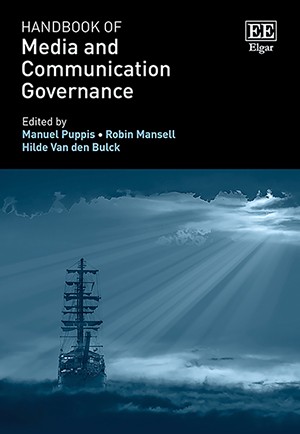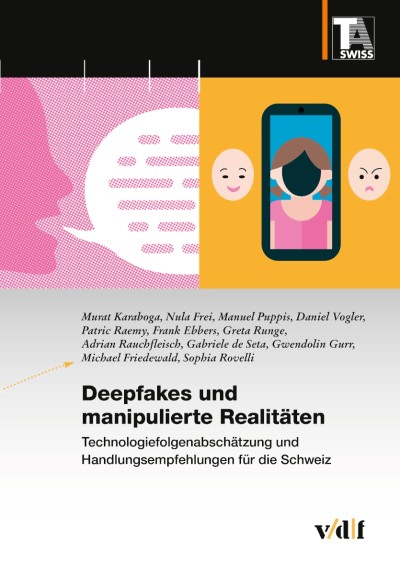Selected Book Publications in the Field "Media Systems and Media Structures"

Puppis, M., Mansell, R., & Van den Bulck, H. (Eds.) (2024). Handbook of Media and Communication Governance. Cheltenham: Edward Elgar.
This state-of-the-art Handbook provides unique insights into the governance practices and institutions shaping digitalized public spheres. Focusing on the power relations involved, it presents diverse approaches to key debates in media and communication governance, showcasing groundbreaking advances in the field.
Contributing authors explore the impact of long-standing trends such as commercialization, digitalization and transnationalization on media and communication governance, highlighting urgent new developments including algorithmization and datafication. Combining theoretical inquiry with cutting-edge empirical analysis, they address governance challenges at the regional, national and global levels to provide a broad view of the social ordering of media systems. Ultimately, the Handbook explores how to protect the public sphere in the digital age and ensure that media organizations and platforms meet democratic expectations.
Adopting an interdisciplinary approach, this Handbook is an invaluable resource for students and scholars of media and communication studies, digital governance and platform studies. It will also be of interest to policymakers seeking to develop effective regulatory systems for the modern media and communications environment.

Karaboga, M., Frei, N., Puppis, M., Vogler, D., Raemy, P., Ebbers, F., Runge, G., Rauchfleisch, A., Seta, G. d., Gurr, G., Friedewald, M., & Rovelli, S. (Hrsg.). (2024). Deepfakes und manipulierte Realitäten. Technologiefolgenabschätzung und Handlungsempfehlungen für die Schweiz (TA-SWISS, Band 81). Zollikon: vdf.
Die Imitation von Stimmen und Gesichtern mittels neuer KI-Technologien wird zunehmend einfacher – und die Resultate sind schon heute kaum mehr von echten Stimmen und Gesichtern zu unterscheiden. Diese Technologien bieten viele kreative und innovative Nutzungspotenziale, sowohl für Privatnutzende als auch für verschiedene Wirtschaftsbereiche. Andererseits sind Deepfake-Videos und Deepfake-Audios auch Quell zahlreicher Risiken: Sie können z.B. politische Desinformation vereinfachen, Mobbing Vorschub leisten und kriminelle Aktivitäten begünstigen.
Angesichts der fortwährenden Debatten über die Chancen und Risiken von Deepfakes wird in der Studie der Umgang mit einer veränderten Realität diskutiert, in der täuschend echte Fälschungen mit Originalmedien um die Aufmerksamkeit der Zuschauer konkurrieren. Was ist technisch möglich? Welche Grenzen setzt das Recht? Was weiss und denkt die Bevölkerung über Deepfakes? Wie geht der Journalismus mit dem Phänomen um? Welche Rolle könnten Deepfakes in Politik und Wirtschaft spielen? Die Studie bietet zu diesen und weiteren Fragen fundierte Orientierung und zeigt darauf basierende Handlungsmöglichkeiten auf.

Puppis, M. (2023). Medienpolitik. Grundlagen für Wissenschaft und Praxis. München: UVK.
Digitalisierung, Transnationalisierung und Kommerzialisierung stellen die Medienpolitik vor große Herausforderungen. Wie kann sichergestellt werden, dass Medien und Plattformen ihre wichtige Funktion in einer demokratischen Gesellschaft erfüllen? In diese Thematik führt Manuel Puppis systematisch und umfassend ein. Er vermittelt die Grundlagen für eine kritische Auseinandersetzung mit Medienpolitik, Medienregulierung und Media Governance. Problemorientiert und international vergleichend diskutiert er die verschiedenen Themenbereiche der Medienpolitik in Europa – von Medienkonzentration über den öffentlichen Rundfunk, Medienförderung, Plattformen und Algorithmen bis hin zu Medienkompetenz und Datenschutz.

Van den Bulck, H., Puppis, M., Donders, K., & Van Audenhove, L. (eds.) (2019). The Palgrave Handbook of Methods for Media Policy Research. Cham: Palgrave Macmillan.
The Palgrave Handbook of Methods for Media Policy Research covers the craft that is and the methods used in media and communication policy research. It discusses the steps involved in conducting research, from deciding on a topic, to writing a report and everything in between and, furthermore, deals with a wide variety of qualitative and quantitative methods of data collection and analysis. The handbook invites researchers to rediscover trusted methods such as document analysis, elite interviews and comparisons, as well as to familiarize themselves with newer methods like experiments, big data and network analysis.
For each method, the handbook provides a practical step-by-step guide and case studies that help readers in using that method in their own research. The methods discussed are useful for all areas of media and communication policy research, for research concerning the governance of both mass media and online platforms, and for policy issues around the globe. As such, the handbook is an invaluable guide to every researcher in this field.

Simpson, Seamus, Puppis, Manuel, & Van den Bulck, Hilde (eds.) (2016). European Media Policy for the 21st Century: Assessing the Past, Setting Agendas for the Future. New York/London: Routledge.
Media policy issues sit at the heart of the structure and functioning of media systems in Europe and beyond. This book brings together the work of a range of leading media policy scholars to provide inroads to a better understanding of how effective media policies can be developed to ensure a healthy communication sector that contributes to the wellbeing of individual citizens, as well as a more democratic society. Faced with a general atmosphere of disillusionment in the European project, one of the core questions tackled by the volume’s contributors is: what scope is there for European media policy that can exist beyond the national level? Uniquely, the volume’s chapters are structured around four key policy themes: media convergence; the continued role and position of public regulatory intervention in media policy; policy issues arising from the development of new electronic communication network environments; and lessons for European media policy from cases beyond the EU. In its chapters, the volume provides enriched understandings of the role and significance of policy actors, institutions, structures, instruments and processes in communication and media policy.

Puppis, Manuel, Künzler, Matthias, & Jarren, Otfried (eds.) (2013): Media Structures and Media Performance / Medienstrukturen und Medienperformanz. Wien: ÖAW (Relation N.F., Bd. 4).
Media structures play an important role in explaining media performance. The research on media systems, institutions and organizations developed significantly over the last decade. This volume contains contributions that deal with media structures and their change, the influence of media structures on both media organizations and media content as well as the state of research field.

Just, Natascha, & Puppis, Manuel (eds.) (2012): Trends in Communication Policy Research. New Theories, Methods & Subjects. (ECREA Book Series, Vol. 7). Bristol/Chicago: Intellect.
Technological, economic and social trends are changing the context of communication policy. This raises not only the question of what these developments mean for policy-making but more importantly of what the implications are for communication policy research.
Trends in Communication Policy Research, the newest volume of the ECRA book series, aims to foster such a discussion by offering an overview of and insights into current and future areas of inquiry in this contested policy field. It is argued that scholars need to apply theories that have previously not been considered, to scrutinize research methods more thoroughly and to keep an open mind regarding new research subjects. It is discusses how to approach communication policy issues theoretically and methodologically and which policy challenges are emerging that require scholarly attention. The book is thus divided into three parts: new theories, new methods and new subjects.
With contributions from leading and emerging communication policy scholars from Europe and beyond, Trends in Communication Policy Research comprises the very latest developments in the theories, methods, and practical applications of the dynamic field of communication policy research.
